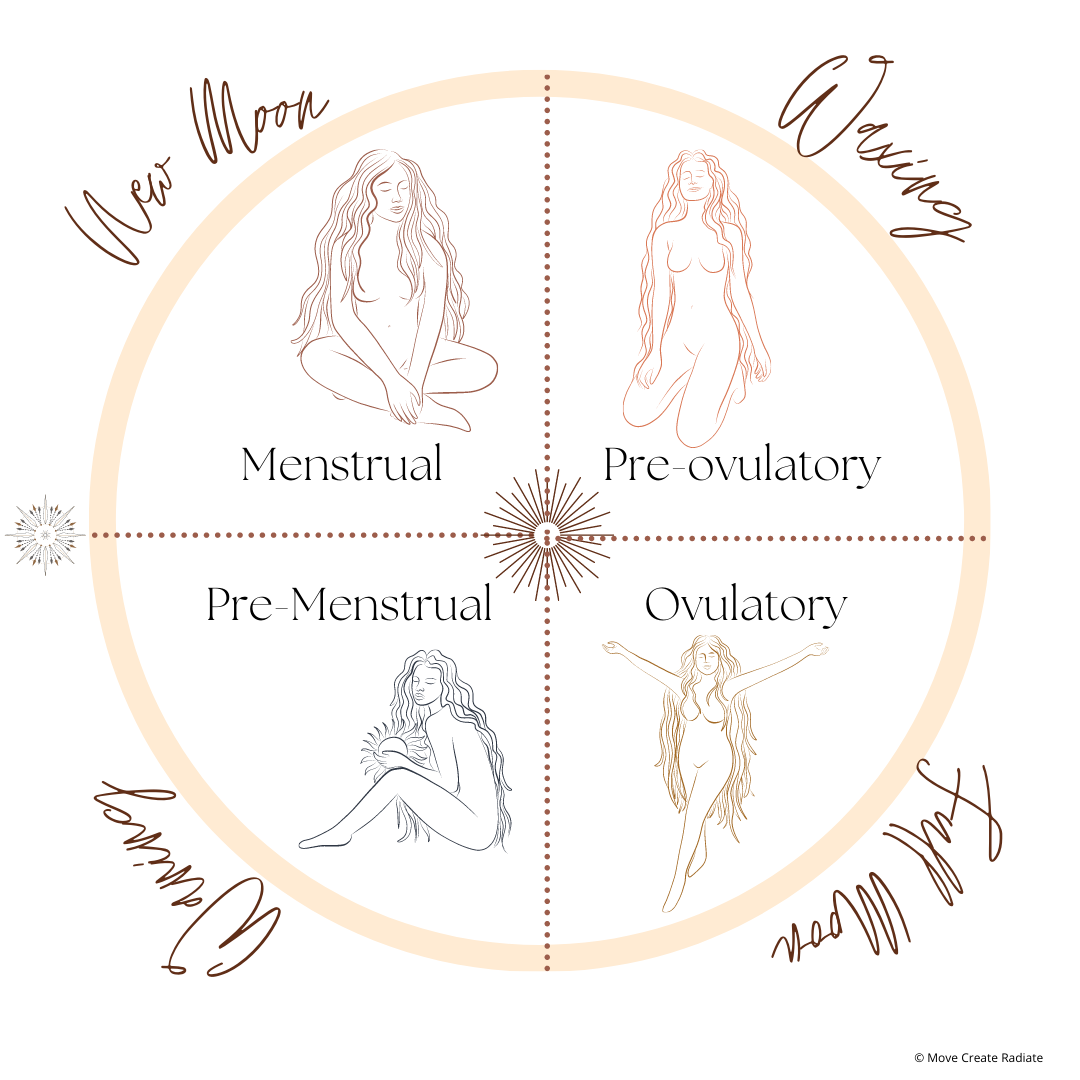Why Does Having A Cycle Matter?
With many popular options for hormonal birth control that reduce the time of, the frequency of, or the event all together of having a period, many people are wondering, do women even need to have periods? Beyond that, do women need to experience the full range of a cycle that encompasses more than just a bleed?
Let’s look at this question from a biological and a psychological stand point.
First of all, biologically. Many doctors in support of periods agree that the most important role of a woman’s cycle is that it is an indicator of underlying health issues. This is supported so strongly by research that currently the American College of Obstetrics and Gynecology (ACOG) and the American Academy of Pediatrics (AAP) advise health practitioners to consider periods as the 5th vital sign of the body. Regular, painless, and easy periods between menarche and menopause indicate that a body is functioning normally. Not only do periods indicate whether a person is fertile, it also gives information about hormonal balance, bone health, nutrition, chronic stress, and other serious health issues. Doctors agree that issues such as irregular or painful periods can be a sign of serious health problems. Without these indicators, health issues can go undiagnosed and can flair up in other ways making treatment more difficult.
Cycles are also beneficial for women’s brains. In a study from BBC that studied women’s brain patterns, it was found that women’s thought processes change during the month with varying hormones allowing for a variety of ways to think about and solve problems. For example, right after a period, women have heightened spacial awareness, and then three weeks after a period, they have a peak in verbal and communication skills. In general, the variety of brain patterns that women experience during the month contributes to less lateral thinking as is seen in their male counterparts. This cohesive connection between the right and left side of the brain contributes to a wide variety of strategies of how to solve a particular problem.
Other biological benefits include, a rush of of oxytocin (the love hormone) during a period, allowing women to feel held, supported, and even to soothe pain. A period naturally lowers blood pressure for two weeks per month. Menstrual bleeding also rids the body of excess iron stored in the tissues which can contribute to cardiovascular disease.
In conclusion, regular menstruation indicates homeostasis within the body. An article from the Women’s Health Network reads that Hormonal balance leads to good moods, regular sleeping patterns, and balanced libido. When the body is under chronic stress, whether from environmental or psychological stress, hormones come out of balance and an irregular period is one of the first signs of that imbalance.
Most hormonal birth control methods are created in ways that make periods unnecessary for those on hormonal birth control. From this standpoint, women may understand that having a period is not important. The question is, what is the trade off of not having a cycle?
To look deeper into this, let’s also look at the psychological effects of a menstrual cycle.
Having a menstrual cycle (a whole cycle, not just a period, read more about that here) gives women a rhythm to their lives. Through tracking and understanding one’s patterns throughout the cycle, women can track the best (and worst) times for exercise, social obligations, physical touch, socialization, taking on projects, brainstorming, analyzing, listening, planning, intimacy, and many other qualities. Imagine if you knew exactly when your partner, boss, employee, sister, roommate etc. was excited about taking on big projects and adventures vs. when she needed to be alone and needed to rest. Or when she would be thinking more logically vs. more intuitively. The magic of the cycle is this deep inner knowing that women possess when they take the time to get to know their unique cycles.
Alexandra Pope and Sjanie Hugo Wurlitzer in their book, Wild Power, describe the menstrual cycle as a woman’s first and most intimate spiritual practice. Each stage teaches a woman about her patterns, what she’s excited and passionate about, what she needs more and less of in her life, and teaches her how to rest, a lost art in today’s society.
Honoring the whole menstrual cycle, yes the ups AND downs also creates self-acceptance and self-love in a world that often shames, pushes to the side, or avoids talking about it. A study conducted by the International Women’s Health Coalition found that there are about 5,000 slang words to refer to menstruation in 10 different languages.
From changes in exercise, mood, nutritional needs, willingness to socialize, and ability to think creatively women can hone in these skills to optimize these skills at the best time in their cycles. By following these needs, women can take advantage of the times of the month when they have the most energy and best communication skills and can honor the times they need to rest. This practice of cyclical living allows for cultivating sustainable energy. These practices prevent burnout and promotes a balanced mental and emotional system.
Everyone experiences cycles differently so if you are curious, please feel free to reach out to me and to review some of the further resources below.
Want to work with this on a deeper level:
Work 1:1 with me. We will work together to optimize your unique cycles
Take a self-paced online workshop or course to embody this knowledge.
Resources and further reading:
https://www.npr.org/sections/health-shots/2016/05/23/478562615/do-women-need-periods
https://redschool.net/13-powerful-reasons-love-period-menstrual-cycle-part-1/
https://www.womenshealthnetwork.com/pms-and-menstruation/health-benefits-regular-periods.aspx
https://elemental.medium.com/doctors-think-your-period-should-be-a-fifth-vital-sign-5b882c864783
https://www.chicagotribune.com/news/ct-xpm-2003-06-04-0306030348-story.html
Pope, Alexandra and Hugo Wurlitzer, Sjanie. Wild Power: Discover the Magic of Your Menstrual Cycle and Awaken the Feminine Path to Power. Hay House, Inc: 2017.
Cycle on!


